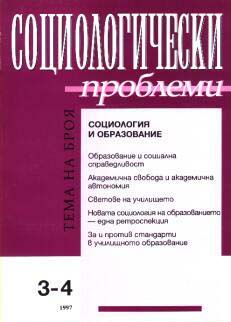Публичният статус па науката в основните типове съвременни общества
The Public Status of Science in the Main Types of Contemporary Societies
Author(s): Galin GornevSubject(s): Social Sciences
Published by: Институт по философия и социология при БАН
Summary/Abstract: How to explain the obvious differences in the public status of science and technology within the three main types of contemporary societies: modern pluralistic, modern totalitarian, and postmodern societies: Proceeding from the idea that the whole modern civilization is fundamentally hounded to the process of exploitation of geological resources (Bauman), the author assumes that the principal demarcation between modernity and postmodernity has to be sought in the different ratio between socialized and non-socialized nature. What we observe in the case of modernity is a lower proportion of technological artefacts accompanied by optimistic vision of unlimited energy resources fully dependent on human reason and will. This "historical apriori" of the modern society projects itself in the reail of science and technology as "standard conception" of scientific knowieuge (Mulkay) as well as social tendency towards their uncritical worship. Raving some of the essential characteristics of modernity.Totalitarian societies are distin-guisned for the paradoxical mixture of ideological dogmatism and hypetrophied scientism/progres-sism determining their chronic deafness to the aspects of risk in human life. On the other hand, the postmodern society is characterized by sui generis trespassing of a critical point beyond which the socialized elements start prevailing in the human habitat over their naturai counterparts. In the changing existential conditions the modern belief in the inexhaustibility of the naturai resources begins to be repiaced by the idea of their vulnerability thus calling in question the technological attitude (El-lui) immanent of the whole modern civilization. All these tendencies undermine the privileged status of the scientific community in the public space and contribute to its perception as a group that is highiy useful but equally important to society as any other professional group.
Journal: Социологически проблеми
- Issue Year: 29/1997
- Issue No: 4
- Page Range: 3-17
- Page Count: 15
- Language: Bulgarian
- Content File-PDF

